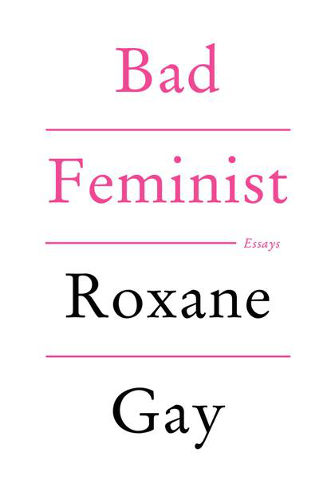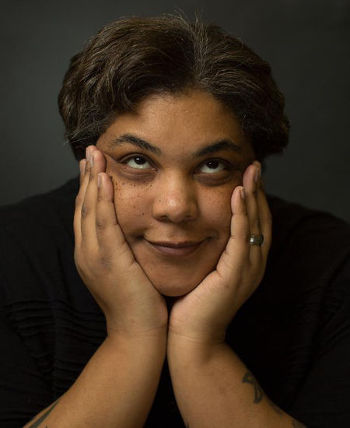There’s No “Doing Feminism Wrong”: An Interview With ‘Bad Feminist’ Writer Roxane Gay
"Writing can only accomplish so much, but it's a start. It's doing something instead of doing nothing."

In Roxane Gay’s much discussed essay collection Bad Feminist, she writes that feminism has suffered a certain “guilt by association,” because we conflate feminism with professional feminists, whom we prop up and tear down according to our whims.
For the record, I am a very good feminist. I engage in daily warfare against sexism, I support women as both a category and as individuals in as many ways as I can, and I focus a lot of my time reading and thinking about gender and equality. Which maybe sounds boring, but also, I have Anna Nicole-blonde hair and own many multi-tools and can list the books in the Old Testament #complex.
A male friend said something weird to me recently, something along the lines of “your feminism flies out the window when you are around me,” by which he meant, you are a bad feminist. I suddenly, viscerally, understood why the good femmo/bad femmo divide exists in the popular imagination. It’s never about individual people’s contributions to gender equality, but rather about some twisted perception of what a feminist is supposed to be, and this supposed image is the same image that is used to deride feminists, feminism, and women more generally.
When this dude assumed that I was compromising my feminism by hanging out with him in ways that supported the fact that I could be friends with boys, forgive individuals for their political folly, and say, without shame: “I think this is the cutest I’ve ever looked,” his presumption was that feminism was not about fighting for women to live safe, full, and satisfying lives regardless of their sexual, biological, or gendered positions, but rather that feminism was just a clubhouse for pathetic, humourless, and dejected losers. Incorrect.
Gay’s “bad feminism,” which has informed many young women who’ve read the book, is simply her recognition of the term feminism, and the fact that she, like everyone else, sucks at being perfect: “Feminism is flawed because it is a movement powered by people and people are inherently flawed.”
I spoke with Gay — who will appear at the Wheeler Centre in Melbourne on March 5, and the All About Women festival in Sydney on March 8 — about some of those imperfections, those expectations, Twitter fame, laziness, and early femmo reading.
–
Ellena Savage: Since Bad Feminist and An Untamed State were released, have you found yourself being held to any unrealistic “feminist pedestal” kind of standards?
Roxane Gay: To an extent, certainly. I received some pushback from people who said that the term “Bad Feminist” was a “cop-out,” and I’ve also had people who’ve tried to make me into a spokesperson for feminism. People are going to do what they’re going to do, and so I just try to roll with it. 
You’re speaking on a panel called ‘How to be a Feminist’ with a bunch of feminists including Germaine Greer. When I was seventeen my mum gave me a copy of The Female Eunuch, which encouraged me to taste my own menstrual blood. Do you have any memories of early feminist reading that influenced you?
Well, my early feminist reading was things like anything by Judy Bloom, especially Forever. These weren’t explicitly feminist texts, they were just these awesome books about young women that I loved, and so for me, they were oftentimes the formative texts that I was reading.
As well as being normal-famous, you’re also kind of Twitter-famous. And what I like about following you on Twitter is that all the trolling and hostility on that platform, you always seem to give people the benefit of the doubt. Can you describe your relationship to Twitter?
Yeah, it’s definitely a fun place, and I enjoy it, and there’s a lot of nonsense there as well, so I just try and kill ’em with kindness. Sometimes they’re so bizarre, and so rude, that the only thing I can do is say “you know what? I hope you have a beautiful day.” It’s so funny how rude they are. Once in a while I lose my temper and I let them have it, as well, and that feels good.
Feels good?
It does. Absolutely! I’m not a saint, I’m not a saint. So, be careful.
You’re hugely prolific, but I read on your Tumblr that some days, you “don’t feel right calling [yourself] a writer” because instead of writing you’ve spent the day watching TV and refreshing your email and whatnot. I kind of think that writers get a bit excessive about what they think labour means to them. Do you think that’s true? That in trying to earn a living out of writing, writers develop pretty vast expectations of themselves?
Yeah, I think we’re very hard on ourselves as writers. I know I’m hard on myself, and I oftentimes have unrealistic expectations of what productivity looks like. Sometimes when I’m not writing I’m still thinking, or still reading, or doing something that will eventually manifest itself through writing.
Qantas flight attendants are mega hot.
— roxane gay (@rgay) March 1, 2015
Many of your essays are framed very personally, and this probably sounds inane, but I wonder if you ever worry that your readers will ever judge you, or misinterpret you through your writing?
Oh, of course I do, and they do. I worry about that all the time, but I can’t let that control my life, or I’ll never get anything done. People are going to do what they’re going to do, and I’m going to write what I’m going to write.
 Are you conscious of your audience when you’re writing? Or does that come later?
Are you conscious of your audience when you’re writing? Or does that come later?
That comes later. I try not to think about audience at all, I write for myself. If I’m thinking about audience, I’ll try and temper my opinions, and I don’t want to do that when I’m writing. I just want to let go.
Do you have any thoughts on the prevalence of the “I” speaker in the contemporary essay form? Is it about enunciating the self, these days, or has it become a matter of style?
I think it’s both. I think it’s sort of prioritising the self, and making it clear that voices matter. I don’t think it’s necessarily a problem, I think that essays have to look inward and outward, they have to be relevant to the reader in some way. And so if it’s just me-me-me, and there’s no reaching outward, then that’s the problem, it’s not the “I” that’s the problem. It’s just that the writer is not doing their job well.
There’s no way of quantifying the impact works of literature can make, but you’ve written about the fact that in face of real injustice, that “silence is not an option but words are not enough.” Without meaning to criticise you or any other writer, do you ever feel that there’s a vanity to writing during times like these?
No, I don’t feel like there’s a vanity to writing, at all. I mean there can be, but most people write for good reasons, and have important things to say. And writing can only accomplish so much, and we have to keep that in mind. But it’s a start. It’s doing something instead of doing nothing.
As well as Bad Feminist and An Untamed State, what books are essential reading for young feminists?
Possessing the Secret of Joy by Alice Walker, and Feminism is for Everybody by bell hooks.
–
Roxane Gay is appearing at Melbourne City Conference Centre on Thursday March 5, and at the Sydney Opera House’s All About Women conference on Sunday March 8.
–
Ellena Savage edits and writes for The Lifted Brow and Spook Magazine. She’s currently a postgraduate researcher at Monash University, and takes a lot of selfies. Say hi at ellenasavage.com

